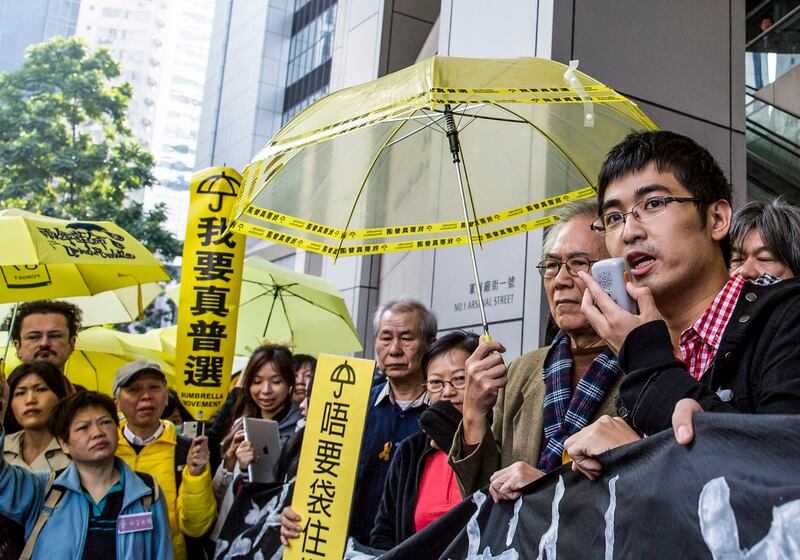Eight years ago, Hong Kong law professor Benny Tai proclaimed the official launch of his "Occupy Central with People and Love" civil disobedience movement campaigning for fully democratic elections.
Tai, who is now awaiting trial for "subversion" for his role in a 2020 democratic primary, launched the movement in response to the ruling Chinese Communist Party (CCP)'s Aug. 31, 2014 decree that, while the city's voters could enjoy a one person, one vote system, they could only choose from a slate of candidates already approved by Beijing.
The government's 2014 plan, which was eventually imposed on Legislative Council elections in December 2021, was rejected by pro-democracy politicians and student activists as "fake universal suffrage," prompting a wave of class boycotts and sit-ins across the city, including an "invasion" of Civic Square, which had been declared off-limits by police.
Among the student leaders who took Tai's idea and turned it into a 79-day mass civil disobedience campaign that saw thousands of people camping out on major thoroughfares in downtown Hong Kong was Alex Chow, who as student union chief spearheaded the movement alongside youth activists Joshua Wong, Agnes Chow, Nathan Law and Lester Shum.
"Everyone was forced to escalate these non-violent methods to put more pressure on the government, because there was no other channel left to the really huge number of Hong Kongers who were demanding political reform in 2014," Chow told RFA in an interview marking the eighth anniversary of the movement.
"It was very disappointing that the occupation by the Umbrella Movement was unable to get the government to make these reforms," he said.
"But that feeling of disappointment actually prompted even more resistance in Hong Kong later on," Chow said. "It was behind the mass movement against extradition [to mainland China] in 2019."
Joshua Wong is currently jailed for his part in the 2019 pro-democracy movement, while Shum and Agnes Chow have also served time in jail.
Like Alex Chow, Law is currently in exile overseas, wanted for alleged criminal offenses since a draconian national security law imposed on Hong Kong by Beijing took effect on July 1, 2020.
The early days of Occupy Central, with widespread use of tear gas by riot police on young people defending themselves with little but umbrellas and face-masks, saw Hong Kong's political struggles make headlines around the world.

By the time the 2019 mass protests erupted over plans to allow the extradition of alleged criminal suspects to face trial in mainland China, it was becoming clear that Beijing had no intention of keeping promises of fully democratic elections made as part of the 1997 handover agreement, nor of allowing the city to maintain its traditional freedoms for at least 50 years.
"Without the Umbrella Movement, we would never have seen such a strong public reaction, nor would the voices opposing [the extradition amendment] have been so loud," Chow said. "So the Umbrella Movement was extremely important."
"It was the turning point of an era, and it meant that Hong Kongers were aware of this, and of the need for change," Chow said.
"A lot of schoolkids and young people were involved in this movement in 2014, bringing an important momentum to bear, and making the Umbrella Movement happen," he said.
"Their actions were a wake-up call to many more Hong Kongers, who came to understand that, without reform, there would be no future for Hong Kong," Chow said. "We had enough power to say no to Beijing, and to the Hong Kong government, and to refuse to accept [Beijing's Aug. 31, 2014 decree on the electoral system]."
"There's no way Hong Kong could have made the kind of progress [towards political awakening] that it did without ... the Umbrella Movement]."
Since arriving in the U.S., Chow has thrown himself into "international front" work, serving on the board of the Hong Kong Democracy Council (HKDC), which vows to be "a voice for Hong Kong and Hong Kongers in the U.S.," according to its website.
The international pro-democracy lobby for Hong Kong successfully lobbied the U.S. government to impose sanctions on Hong Kong and Chinese officials, and removing the city's status as an independent trading entity.
U.S. allies have also offered varying degrees of assistance to Hong Kongers fleeing political persecution, including the U.K. government's offer of citizenship-track visas to more than three million holders of the British National Overseas (BNO) passport and their dependents.
Nonetheless, the complete suppression of dissenting voices in Hong Kong in the wake of the national security law, as well as the jailing of dozens of fellow activists and democratic politicians, has taken a huge psychological toll on activists in exile.
"I see so many of my colleagues in Hong Kong being detained and imprisoned, and some very close friends have basically cut off contact with me," Chow said.
"I have been very lonely here in the U.S. -- I went through a period of huge grief last year."
"[I was wondering] if there is still any hope for Hong Kong, and what else I could do to help our people," he said. "How can you connect Hong Kong to what you do, if you can't even go back there?"
"There has been an enormous amount of pain and struggle, and a lot of self-doubt," Chow said.
Translated and edited by Luisetta Mudie.
